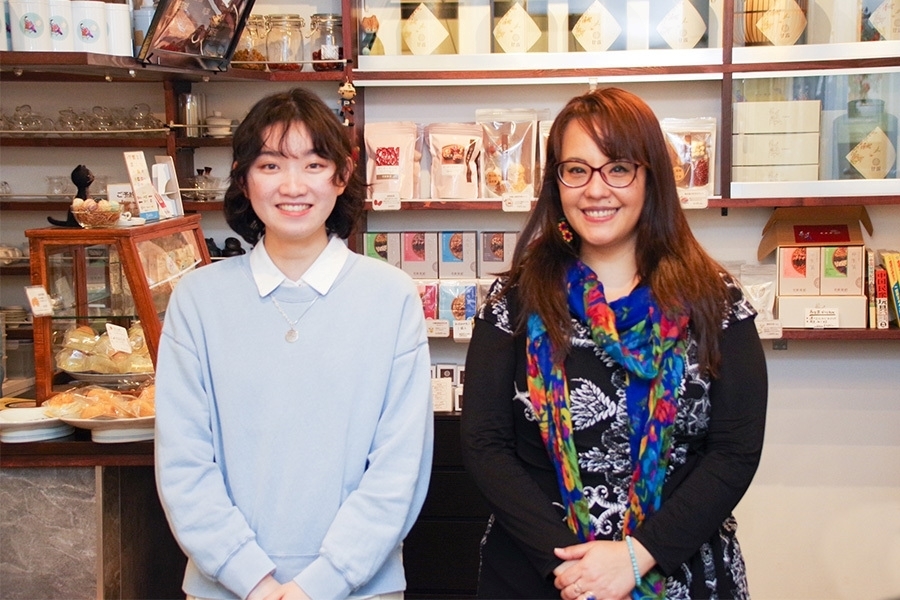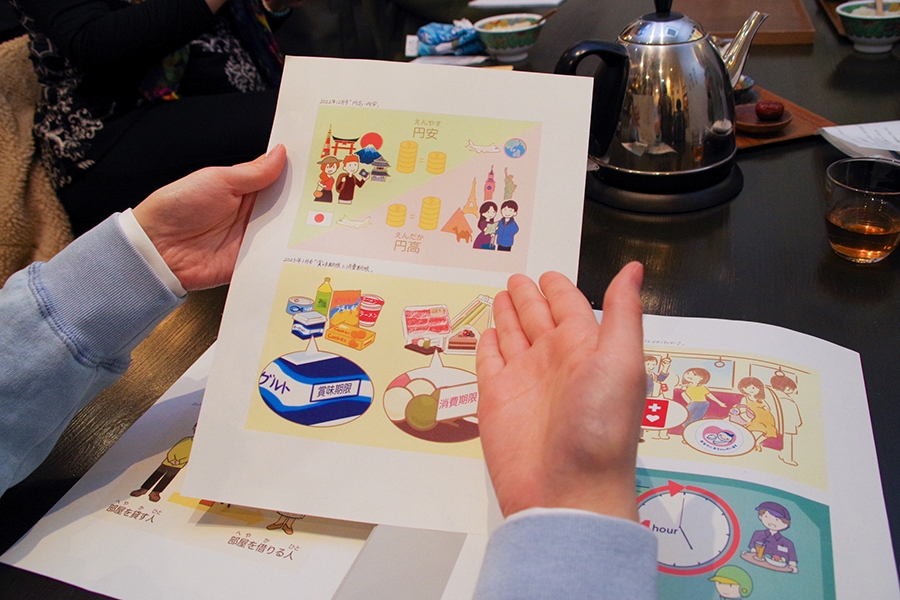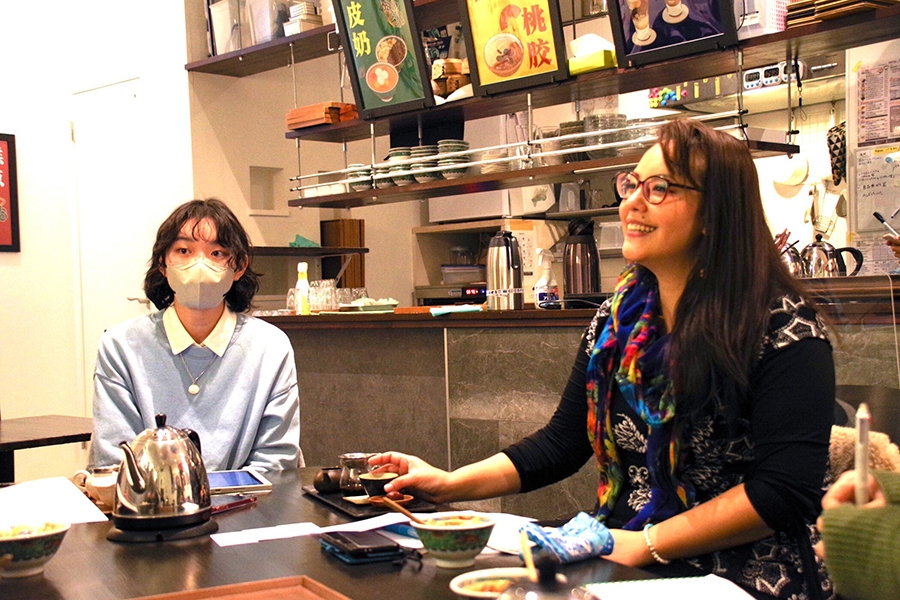Intercultural Crosstalk
Special Edition: About the TIPS’ “Newsletter” ~Two members of the production team talk~

Profiles
Kaku (From China)
- Years of residence in Japan
- 2 years
- Native language
- Chinese
- Favorite Japanese words
- "Yareru koto wo yaranaide kokai suruno wa iya" (I don't want to regret not doing what I can.)
- Favorite places in Tokyo
- Kichijoji
- Favorite food
- Watermelon, nori (dried seaweed), oden (a type of Japanese hot-pot dish)
- Working in own country
- None (student)
- Working in Japan
- Student, illustrator, Chinese language teacher, restaurant staff
Yuki (From Chile)
- Years of residence in Japan
- 3 years
- Native language
- Spanish, Japanese
- Favorite Japanese words
- Ichigo Ichie (once in a lifetime occurrence, meaning to treasure the moments), wabi-sabi (aesthetic about beauty in imperfection)
- Favorite places in Tokyo
- Odaiba
- Favorite food
- Ramen (noodle soup)
- Working in own country
- Consultant, Translator, Japanese Language Teacher, Nikkei Association Board member
- Working in Japan
- Travel Agency, NGO, Disaster Relief, Events, Translator
About the "Online Newsletter" of Tips

I make the illustrations for the "Tips for TOKYO Life" section. I love drawing, so I really enjoy making these illustrations. I like the words that are selected for each edition.
Are there any illustrations or articles that are stand out as memorable for you?
Yes, "円高・円安(Stronger yen / Weaker Yen)", "おくすり手帳(Medication Record Book)" and "敷金・礼金(Deposit and Key Money)" are memorable for me. There were many Japanese words that I didn’t know in these articles, so I learned a lot. Especially in the "Deposit and Key Money" article, since we don’t use "Key Money" in China. I thought it was unreasonable to have to pay key money. I do think it’s great that the articles introduce the cultural differences properly. What work do you do in the newsletter, Yuki?
I translate the "Intercultural Crosstalk" articles. I enjoy the variety of topics, and am able to learn a lot from them. I was born into a multicultural environment as well, and there were many things that I had trouble with when I was a child. Every time I changed schools, from Spanish, to English, to Japanese schools, I had to study harder, but this is now my treasured asset. I am extremely grateful to my parents for this. One of the hardest things in translating the articles is to make sure that I grasp the correct nuance of what the participants are saying.
Is there an article that is memorable for you?
The disaster relief edition was memorable for me, since I’m involved in this area in my current work. The edition on child-rearing was interesting as well. For example, I have a Chinese friend that is married to a Japanese national, and like them, I think there are many people that wonder about heritage language.
Where Do You Get Information in Japan?


I came to Japan as an exchange student because I was interested in Japanese anime and subcultures. It was postponed for a year because of COVID-19, but I had always wanted to come to Japan.
My father is Japanese and my mother is Chilean. My father worked in the Ministry of Foreign Affairs, so we lived in many different countries. I was in Japan for 3 years in junior high school, but after my father retired, we moved to Chile, so I came to Japan 3 and a half years ago because I wanted to live in Japan someday as an adult.
Regarding how to gather information, I started by asking my senpai (seniors with more experience), who are also Chinese. I also asked them about the formalities or procedures for living in Japan, such as health insurance.
I usually ask my friends or colleagues at work. I frequently look at a Facebook page called "Chileans in Japan”. It was actually created by my brother about 20 years ago, and I often get information from there. When I ask a question, someone always answers. When I search for something online, it is in Japanese and English. I don't search much in Spanish because there is not much information in Spanish.
When I look something up, I search in Chinese and Japanese. For Chinese people, it is rather easy to read if there are many kanji (Chinese characters used in Japanese too). If I search in Japanese, it will be displayed in Japanese, which is better when talking to Japanese people. What I often check out are groups of Chinese exchange students. They give away furniture and have information on part-time jobs.
About Multicultural Integration in Japan

I think the term "tabunka-kyosei (interculturalism)" came from Japan. When I was in China, I was a young student, so I never really experienced multicultural integration.
Chile has about 10 indigenous communities, with different cultures, languages, and appearances, so interculturalism has been inherent for a while. Also, Chile has more widely welcomed immigrants in the last 20 years, so there are many people from neighboring countries. In this sense, interculturalism is happening, but they are still in a continuous learning process.
I think people are getting used to the fact that there are many foreigners in Japan, but some people are not really aware of the idea of coexistence. I believe that both Japanese people and foreign nationals can get to know each other by participating in events together.
I agree that it is very important to participate in things together. In Japan, the language barrier is much higher than in Chile. Culture can be partly understood through language, so for example, I think it is possible to understand the kindness and care that is said in a roundabout way like in Japan, which is learned as you study the language.
These days, signs and billboards have "yasashii nihongo(plain Japanese)" and kanji with readings, and there are also versions in various languages, which I think is great.
I agree with Kaku. Compared to 20 years ago, there is a lot more information available for foreign nationals now, and I think the environment is more friendly. It is difficult to create an environment where both sides can work well without understanding each other's culture. I think Japan is trying to do its best.
How was the dialogue between the production members?
The "Newsletter" of TIPS (Tokyo Intercultural Portal Site) will continue to provide information with the aim of creating a multicultural integrated society in which everyone can play an active role.
